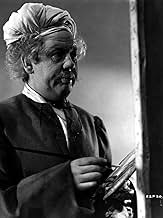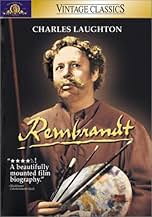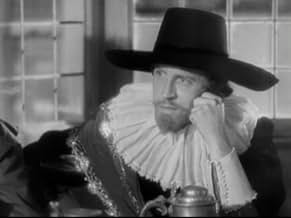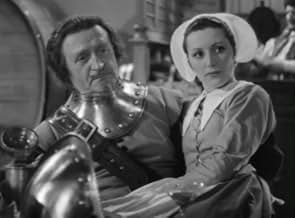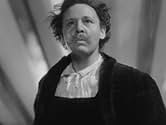The respected painter takes to drink and faces down scandal after his wife dies.The respected painter takes to drink and faces down scandal after his wife dies.The respected painter takes to drink and faces down scandal after his wife dies.
- Director
- Writers
- Stars
- Awards
- 1 win total
- Director
- Writers
- All cast & crew
- Production, box office & more at IMDbPro
Featured reviews
Still New as Portrait of Man and Artist
Alexander Korda, the founder of London Films, appears to be an altogether intriguing personality in cinema history. Brian Eggert in his Deep Focus review nicely observes that he frames his characters "in a way that personalizes the drama, seeing them as people and not dry historical figures." How beautifully this notion occurs to manifest itself in this picture. His REMBRANDT is a movie which is far from any biographical approach but rather stands out as an insight into an artist tormented by conflict between the gravity of 'properly social' requirements and the eagle's wings of inspirations - a genius whose life and work are far from 'too picturesque' traditionalized sweetness. Therefore, Emerson's quote, which I entailed at the beginning of my review, seems to correspond to that development which we find in this barely 'ornamented' 80 minute-long film.
The fact that Korda's movie boasts of many charming moments, beautiful camera shots, dazzling costumes and stunning cinematography remains pretty indisputable. Although the recreation of the Amsterdam of the time does not occur to be fully satisfactory due to certain lacks of possibilities at hand, the interiors make for artistic impressions. The cinematographer Georges Perinal powerfully employs his efforts to combine visual with overtones (consider Rembrandt's indicative love scene with his wife to come, the shadows, the name of his desire written on the table and the ever present storm that sets the tone for the sensually typical moments on the screen). But it is not where the film's triumph really lies.
When seeing the film nowadays, it seems that we are watching quite a modern approach to the 'interpretations' of an artistic personality. The movie, as I have mentioned before, does not focus on descriptive approach of Rembrandt's paintings but rather on the protagonist who speaks his mind, shares what lies deep down his heart. In this way, it's not just like "I am going to present to you a life of an artist" but he invites a viewer for a fruitful discourse of perceptions. Of course we could quarrel here to what extent it is the historical Rembrandt. Ignoring some cinematic liberties taken with the genial leading hero of art, we are at least supplied with a vibrant, vital, engrossing image of a man who grows in both skill and thought. Isn't that what many of us long for in movies?
Apart from flawlessly delivered biblical verses corresponding to his life experience, Rembrandt (Charles Laughton) shares with us his thoughts about life, women, social status, success, his vision of the 'caged' world. His inner dictates allow him to reveal himself, his struggles between vision and reality, 'women' and 'wives,' conventions and Love. As the movie skips all glorification, all baseless idealization or illusionary assumptions, we may 'properly' talk about the movie in terms of Korda's revolutionary approach along with Laughton's revelatory portrayal that deeply focus on the humanity of character. This 'humanization' refers to many scenes from the frequently discussed rejection of THE NIGHT WATCH when Rembrandt powerfully makes it clear to everybody that he wanted to 'paint men. Soldiers. Company marching out' instead of glorified 'gentlemen of rank and position' through his encounter with one of his 'lowest of the low' subjects of painting, a beggar (played by Roger Livesey) along with the lesson both learn from each other, Rembrandt's visit at his hometown Leyden where he aims at recognizing his sense of belonging and hopes to restore his sense of attachment... Concluding from the turmoil, an artist belongs nowhere but his inner individualized existence.
In one scene, Rembrandt says: "Every man is a destined path." Nowhere does it appear as clear as in his relation to WOMEN. He seems to be in love with his wife Saskia (whom we actually never see on screen) but as soon as we appreciate the witty verses in a skillful game of words, funeral chimes toll over the windowed husband mourning and grief. In one moment when he tries to forget the sorrows, he spills the beans about the inner desires (I need a woman I can call my wife) and, unreasonably, gets married to his housekeeper Geertje Dirx (Gertrude Lawrence). However, she symbolizes all that is 'material' and 'down-to-earth' in a subtle man's perception of a woman. "Use your common sense" seems to be the slogan that does not only takes hold of her but which also interrupts the artist's great moment of inspiration. As a cure comes a young and beautiful Hendrickje Stoffels. Strikingly similar in looks to the artist's wife, she inflames jealousy within the envious woman and the Sanhedrin-like assembly of accusers. Within the moral and financial hazards, the love of the two does not find obstacles serious enough to spoil their feelings.
ELSA AND CHARLES supply the movie solely with power scenes of unique chemistry. Brian Eggert memorably points out that "Laughton's busy hands and eyes create an observant, thoughtful character" being "bold yet timid and modest, as only a poor but gifted genius could be." However, he shines fully at Elsa's side Their most unforgettable scene shows them 'recreate' their first meeting when he looks at her as both and artist and a man. With its height of emotions within 'from the inside out' method, derived from Stanislavskyan school, the moment beautifully addresses human longing for the possibility to experience the happiest moments of life once again. Yet, at the same time, it draws parallels with an intriguing assumption that true love is the only source of happiness in anyone's life.
A highly worth seeing movie about a man whose was a destined path and yet a man whose modest approach derived from Solomon's words of wisdom have resulted in transcending portraits that still personify absorbing developments of artists tormented by storms yet touched by the grace of talent...and inspiration growing in a ray of enlightenment.
A Fine Laughton Performance
A Superb Movie
Additionally, it was shot very nicely. Keep in mind that this is a very old movie, but the black and white photography is put together in an almost Rembrandt way.
If you haven't seen Rembrandt then go and get it. You won't be disappointed. Well done!
Laughton on canvas
Later biographical pictures, Lust for Life about Van Gogh and Moulin Rouge about Toulouse-Lautrec had good location photography going for them. Alexander Korda did create some nice sets to depict the Netherlands of the 17th century, but it just isn't the same.
Another difference between Rembrandt and the other two later pictures is while Van Gogh and Toulouse-Lautrec died young, Rembrandt lived to be an old man by the standards of his century. The film takes us on a forty year journey of his life from the death of his first wife until just before he dies. Laughton is great at capturing Rembrandt at every stage of his life.
As compared to those other two 19th century artists, Rembrandt's life was also not the tormented one the others had. Rembrandt is not a deformed cripple like Toulouse-Lautrec nor is he dealing with the onset of mental illness like Van Gogh. Tragedy happens in his life, but the tragedy isn't out of his own character.
Like the other two Rembrandt was constantly plagued with money problems. That's actually what takes up most of the film, the compromises he makes with his artistic vision and the need he has to put bread on the table.
Gertrude Lawrence and Elsa Lanchester do fine as the two women in his life. Laughton and Lawrence did not get along during the making of Rembrandt, that may have helped give their scenes some real bite. Three members of the performing Livesey family are in this film and Roger Livesey is a standout as the beggar who Rembrandt uses to paint his portrait of King Saul from the Old Testament.
Rembrandt is a finely crafted piece of film making and Charles Laughton gives one of his best screen performances. I wish though it had been done on location the way Lust for Life and Moulin Rouge were.
A Portrait Of A Genius - By A Genius
Sir Alexander Korda's production of the life of the celebrated artist is beautifully presented on screen. Chief among its assets - and the main reason for its success - is the magnificent performance by Charles Laughton. Eccentric & temperamental, Laughton could be difficult to work with. But once fascinated by a role he gave it the full vibrato of his own extensive genius - here he makes Rembrandt an equal member of his continuing roster of fascinating portraits from the decade: Henry VIII, Bligh, Quasimodo.
Laughton had the remarkable ability - like the English actor George Arliss, working in the American cinema - of using his physical ugliness to great advantage, his eyes in particular offering glimpses of his characters' souls. At various points throughout the film - a monologue of Woman's Mysteries; reading from The Scriptures - Laughton's beautiful, soothing voice reaches beyond the screen and down the years to caress the listener.
Making a rare screen appearance, stage legend Gertrude Lawrence plays Rembrandt's shrewish housekeeper & companion, Geertje Dirx. Laughton's wife, the luminous Elsa Lanchester, is unforgettable as Hendrickje Stoffels, the housemaid who wins her employer's love and becomes his greatest defender and champion.
The wonderful actor Roger Livesey, almost unrecognizable behind a bushy beard (but there's no disguising that unique voice) is memorable as the ragged beggar Rembrandt hires to model the Old Testament despot Saul; Livesey's scenes with Laughton are among the best in the entire film. John Bryning turns in a sensitive portrait as Rembrandt's son Titus. Sir John Clements has the small role as Govert Flinck (1615-1660), Rembrandt's disaffected apprentice and eventual rival. Movie mavens will recognize an uncredited Wilfred Hyde-White in a tiny cameo as an officer of the Amsterdam Civic Guard.
The film is given first rate production values, with marvelous interior sets & costumes. The exterior Amsterdam sets are visually striking, with the camera angles and the stark angularity of the buildings making them look almost expressionistic. These contrast nicely with the simplicity with which the brief outdoor rural scenes are depicted.
**********************************
Some important dates in the life of Rembrandt:
15 July 1606 - born in Leiden, The Netherlands, to the local miller.
1620-21 - attends University of Leiden.
1631 - moves to Amsterdam.
1634 - marries wealthy Saskia van Uylenburgh.
1639 - purchases large Amsterdam house.
1641 - son Titus is born.
1642 - Saskia dies; Rembrandt paints 'The Shooting Company of Captain Franc Banning Cocq ('The Night Watch').'
1649 - hires Hendrickje Stoffels as housekeeper; she becomes his common-law wife.
1654 - Hendrickje, pregnant with daughter, is censured by church council for living in sin.
1656 - Rembrandt declared insolvent; house & goods auctioned to pay debts.
1663 - death of Hendrickje.
1668 - death of son Titus, aged 26.
4 October 1669 - dies in Amsterdam.
Rembrandt produced approximately 300 etchings, 600 paintings and 1,400 drawings.
Did you know
- TriviaLaughton's speech about women that began "There was a man in the land of Uz" was so popular Hedda Hopper printed it in full in her column in the 9 September 1948 edition of the Los Angeles Times.
- GoofsWhen Rembrandt reveals the newly completed painting, 'The Night Watch', we see not the full, original version that he in fact painted, but the drastically butchered version that was made over 40 years after his death, when the painting was moved from its original exhibition space in the Kloveniersdoelen to a less capacious display space in the Amsterdam Town Hall in 1715.
- Quotes
Rembrandt van Rijn: A creature half child, half woman, half angel, half lover brushed against him... and of a sudden he knew that when one woman gives herself to you, you possess all women. Women of every age and race and kind, and more than that, the moon, the stars, all miracles and legends are yours. The brown-skinned girls who inflame your senses with their play, cool yellow-haired women who entice - and escape you, the gentle ones who serve you, the slender ones who torment you, the mothers who bore and suckled you; all women whom God created out of the teeming fullness of the earth, are yours in the love of one woman.
- Crazy creditsOpening credits prologue: In the seventeenth century Holland was a world power, her ships carried treasure to Amsterdam from all parts of the earth. But her proudest glory was the son of a miller from Leyden, Rembrandt Van Rijn, the greatest painter that has ever lived. He died in obscurity, his belongings no more than a few shillings.
Today no millionaire is worth the money the works of Rembrandt would realise, if ever offered for sale.
- ConnectionsFeatured in Dumb Dora Discovers Tobacco (1945)
- How long is Rembrandt?Powered by Alexa
Details
- Release date
- Country of origin
- Language
- Also known as
- Büyük Ateş-Rembrandt
- Filming locations
- Denham Studios, Denham, Buckinghamshire, England, UK(Studio, uncredited)
- Production company
- See more company credits at IMDbPro
- Runtime
- 1h 25m(85 min)
- Color
- Aspect ratio
- 1.37 : 1


